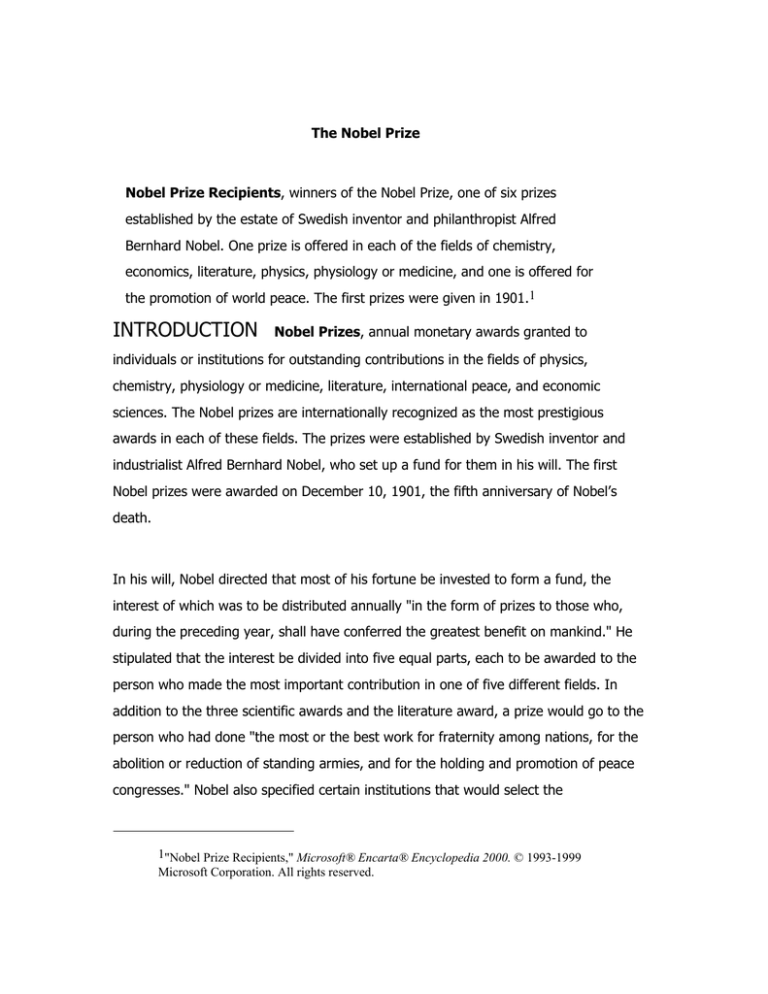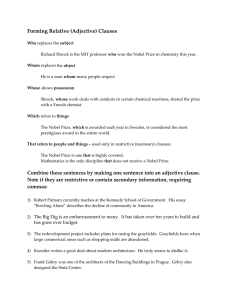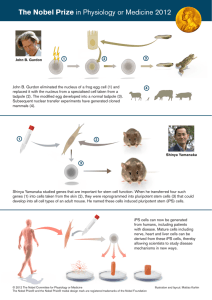
The Nobel Prize
Nobel Prize Recipients, winners of the Nobel Prize, one of six prizes
established by the estate of Swedish inventor and philanthropist Alfred
Bernhard Nobel. One prize is offered in each of the fields of chemistry,
economics, literature, physics, physiology or medicine, and one is offered for
the promotion of world peace. The first prizes were given in 1901.1
INTRODUCTION
Nobel Prizes, annual monetary awards granted to
individuals or institutions for outstanding contributions in the fields of physics,
chemistry, physiology or medicine, literature, international peace, and economic
sciences. The Nobel prizes are internationally recognized as the most prestigious
awards in each of these fields. The prizes were established by Swedish inventor and
industrialist Alfred Bernhard Nobel, who set up a fund for them in his will. The first
Nobel prizes were awarded on December 10, 1901, the fifth anniversary of Nobel’s
death.
In his will, Nobel directed that most of his fortune be invested to form a fund, the
interest of which was to be distributed annually "in the form of prizes to those who,
during the preceding year, shall have conferred the greatest benefit on mankind." He
stipulated that the interest be divided into five equal parts, each to be awarded to the
person who made the most important contribution in one of five different fields. In
addition to the three scientific awards and the literature award, a prize would go to the
person who had done "the most or the best work for fraternity among nations, for the
abolition or reduction of standing armies, and for the holding and promotion of peace
congresses." Nobel also specified certain institutions that would select the
1"Nobel Prize Recipients," Microsoft® Encarta® Encyclopedia 2000. © 1993-1999
Microsoft Corporation. All rights reserved.
prizewinners. The will indicated that “no consideration whatever shall be given to the
nationality of the candidates, but that the most worthy shall receive the prize.”
In 1968 the Riksbank, the central bank of Sweden, created an economics prize to
commemorate the bank's 300th anniversary. This prize, called the Nobel Memorial
Prize in Economic Science, was first awarded in 1969. The bank provides a cash award
equal to the other Nobel prizes.
II
NOBEL FOUNDATION
In 1900 the Nobel Foundation was established to manage the fund and to administer
the activities of the institutions charged with selecting winners. The fund is controlled
by a board of directors, which serves for two-year periods and consists of six
members: five elected by the trustees of the awarding bodies mentioned in the will,
and the sixth appointed by the Swedish government. All six members are either
Swedish or Norwegian citizens.
In his will, Nobel stated that the prizes for physics and chemistry would be awarded by
the Swedish Academy of Sciences, the prize for physiology or medicine by the
Karolinska Institute in Stockholm, the literature prize by the Swedish Academy in
Stockholm, and the peace prize by a five-person committee elected by the Norwegian
Storting (Parliament). After the economics prize was created in 1968, the Swedish
Academy of Sciences has held the responsibility of selecting the winners of that award.
All the prize-awarding bodies have set up Nobel committees consisting of three to five
people who make recommendations in the selection process. Additional specialists
with expertise in relevant fields assist the committees. The Nobel committees examine
nominations and make recommendations to the prize-awarding institutions. After
deliberating various opinions and recommendations, the prize-awarding bodies vote on
the final selection, and then they announce the winner. The deliberations and voting
are secret, and prize decisions cannot be appealed.
III
PRIZES
A prize for achievement in a particular field may be awarded to an individual, divided
equally between two people, or awarded jointly among two or three people. According
to the Nobel Foundation’s statutes, the prize cannot be divided among more than
three people, but it can go to an institution. A prize may go unawarded if no candidate
is chosen for the year under consideration, but each of the prizes must be awarded at
least once every five years. If the Nobel Foundation does not award a prize in a given
year, the prize money remains in the trust. Likewise, if a prize is declined or not
accepted before a specified date, the Nobel Foundation retains the prize money in its
trust.
The prize amounts are based on the annual yield of the fund capital. In 1948 Nobel
prizes were about $32,000 each; in 1997 they were about $1 million each. In addition
to a cash award, each prizewinner also receives a gold medal and a diploma bearing
the winner's name and field of achievement. Prize winners are known as Nobel
laureates.
IV
SELECTION OF PRIZEWINNERS
Nominations of candidates for the prizes can be made only by those who have
received invitations to do so. In the fall of the year preceding the award, Nobel
committees distribute invitations to members of the prize-awarding bodies, to previous
Nobel prize winners, and to professors in relevant fields at certain colleges and
universities. In addition, candidates for the prize in literature may be proposed by
invited members of various literary academies, institutions, and societies. Upon
invitation, members of governments or certain international organizations may
nominate candidates for the peace prize. The Nobel Foundation’s statutes do not allow
individuals to nominate themselves. Invitations to nominate candidates and the
nominations themselves are both confidential.
Nominations of candidates are due on February 1 of the award year. Then, Nobel
committee members and consultants meet several times to evaluate the qualifications
of the nominees. The various committees cast their final votes in October and
immediately notify the laureates that they have won.
V
PRIZE CEREMONIES
The prizes are presented annually at ceremonies in Stockholm, Sweden, and in Oslo,
Norway, on December 10, the anniversary of Nobel's death. In Stockholm, the king of
Sweden presents the awards in physics, chemistry, physiology or medicine, literature,
and economic sciences. The peace prize ceremony takes place at the University of
Oslo in the presence of the king of Norway. After the ceremonies, Nobel Prize winners
give a lecture on a subject connected with their prize-winning work. The winner of the
peace prize lectures in Oslo, the others in Stockholm. The lectures are later printed in
the Nobel Foundation's annual publication, Les Prix Nobel (The Nobel Prizes).





